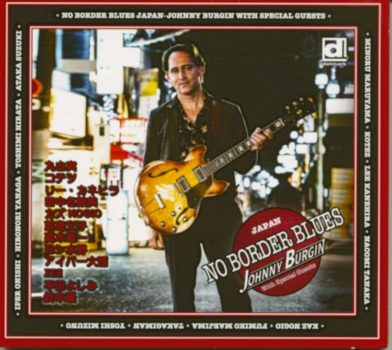 If you google live albums recorded in Japan, a plethora of blues/R&B artists pops up. A shortlist would include Albert Collins, Otis Rush, BB King, Eddie Taylor, Snooks Eaglin, Wilson Pickett, and even Sleepy John Estes and sidekick Hammie Nixon. As a result of such tours, a micro but intense blues scene sprouted in the Land of the Rising Sun that continues today. Through several tours, former Chicago mainstay and now Oregon resident Johnny Burgin has gotten to know its players and the Japanese conformist culture well. In 2014, bassist Yoshimi Hirata booked Burgin for a tour and squeezed in as many Japanese sidemen as possible so everyone would have a shot playing alongside the American guitarist. A few years later, guitarist Tsuyoshi Kato coordinated Burgin’s 2018 tour with a similar game plan. Afterward, Burgin’s partner Stephanie Tice suggested recording an album featuring Japanese players. So, in May 2019, Burgin gathered his peeps and recorded 10 of these 11 tracks at an Osaka studio. (“Two Telephones” was recorded later at Delmark Studios in Chicago.)
If you google live albums recorded in Japan, a plethora of blues/R&B artists pops up. A shortlist would include Albert Collins, Otis Rush, BB King, Eddie Taylor, Snooks Eaglin, Wilson Pickett, and even Sleepy John Estes and sidekick Hammie Nixon. As a result of such tours, a micro but intense blues scene sprouted in the Land of the Rising Sun that continues today. Through several tours, former Chicago mainstay and now Oregon resident Johnny Burgin has gotten to know its players and the Japanese conformist culture well. In 2014, bassist Yoshimi Hirata booked Burgin for a tour and squeezed in as many Japanese sidemen as possible so everyone would have a shot playing alongside the American guitarist. A few years later, guitarist Tsuyoshi Kato coordinated Burgin’s 2018 tour with a similar game plan. Afterward, Burgin’s partner Stephanie Tice suggested recording an album featuring Japanese players. So, in May 2019, Burgin gathered his peeps and recorded 10 of these 11 tracks at an Osaka studio. (“Two Telephones” was recorded later at Delmark Studios in Chicago.)
Burgin does a marvelous job of selflessly sharing the spotlight. He sings on only five tracks, allowing his Japanese counterparts to have the microphone on six others. If you only heard the harmonica-heavy instrumental portion of this, you probably wouldn’t realize this was recorded on the other side of the globe by a group of non-Chicagoans – its apparent blues resonates in their souls. Harp howler Iper Onishi channels Carey Bell convincingly on Bell’s “One Day You’re Gonna Get Lucky” and tackles Little Walter’s mind-blowing solo on “Rattlesnake.” Perhaps no stranger to Cash Box Kings fans, Lee Kanehira, who recorded on the Kings’ last two albums, plays spot-on blues piano steeped in the Chicago tradition. Besides pumping the ivories for all its worth on her original “Pumpkin’s Boogie,” Kanehira sings while harmonica player Kotez and Burgin scorch their parts to a crisp.
In the course of these proceedings, it’s evident that these Japanese guys and gals have made this time-honored American genre their own. Robert Johnson’s immortal “Sweet Home Chicago” is recast as “Sweet Home Osaka;” Kotez sings Little Walter’s “I Just Keep Loving Her” in Japanese as “Mada Sukinanda.” But wait, there’s more. “Samurai Harp Attack” features all three harmonica players, Kotez, Onishi, and Kaz Nogio, all darting and dashing in between the melody and accompaniment lines, allowing everyone ample room to solo. It’s an extremely torrid track, but so is Burgin’s performance on “Two Telephones” with his best playing on the album. An insightful, cultural recording that shows dedication to the blues goes beyond stateside boundaries.




